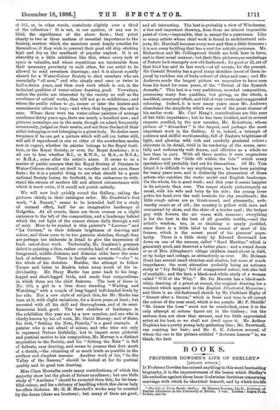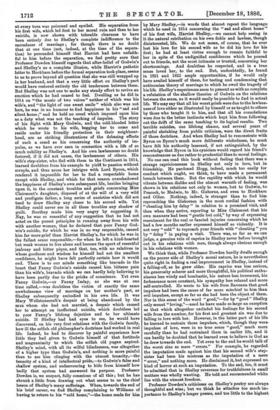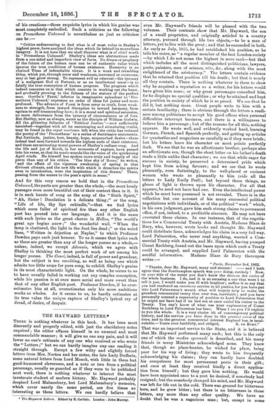BOOKS.
PROFESSOR DOWDEN'S LIFE OF SHELLEY.* [SECOND NOTICE.]
Jr Professor Dowden has missed anything in this most fascinating biography, it is the impressiveness of the lesson which Shelley's life embodies against those loose Godwinian doctrines concerning marriage with which he identified himself, and by which his life • The Life of Percy Bysshe Shelley. By Edward Dawden, LL.D.. Professor of English Literature in the University of Dublin. 2 rob. London; flegsa Pada, Trench, and CO.
at every turn was poisoned and spoiled. His separation from his first wife, which led first to her moral ruin and then to her
suicide, is now shown with tolerable clearness to have been entirely due to Shelley's complete indifference to the sacredness of marriage ; for though there is no doubt that at one time (not, indeed, at the time of the separa- tion) he persuaded himself that Harriet had been unfaith- ful to him before the separation, we feel pretty sure that Professor Dowden himself regards that after-belief of Godwin's and Shelley's as a complete illusion, while Harriet's pathetic letter to Hookham before the formal separation took place, seems to us to prove beyond all question that she was still wrapped up in her husband, and that a very little effort on Shelley's part would have restored entirely the old tenderness between them. But Shelley was not one to make any steady effort to revive an emotion which he had ceased to feel. Dwelling as he did in 1814 on "the music of two voices" neither of which was his wife's, and "the light of one sweet smile" which also was not hers, he was in no humour to find happiness in his "sad and silent home ;" and he held no creed which imposed upon him as a duty what was not the teaching of impulse. The story of his flight with Mary Godwin, and the cold-blooded letter which he wrote to his wife, begging her to come and reside under his friendly protection in their neighbour- hood, are as striking illustrations of the debasing effects of such a creed as his concerning the authority of im- pulse, as we have ever seen in connection with a life of so much nobility as Shelley's. And his own lawlessness no doubt fostered, if it did not cause, the lawlessness of others. His wife's step-sister, who fled with them to the Continent in 1814, learned doubtless from his example to yield to passion without scruple, and thus arose her intrigue with Lord Byron, which rendered it impossible for her to End a respectable home except with Shelley, and which for that reason overshadowed the happiness of Shelley's own subsequent life, besides bringing upon it, in the constant troubles and griefs concerning Miss Clairmont's daughter, disposed of at the will of a very wild and profligate father, a long series of anxieties which did not tend to draw Shelley any closer to his second wife. Yet Shelley could never see in all these troubles any shadow of guilt. Southey made him very angry by suggesting it. Nay, he was so resentful of any suggestion that he had not acted on the purest principles in running away from his wife with another woman, that he declared that poor Fanny God- win's suicide, for which he was in no way responsible, caused him far more grief than Harriet Shelley's, for which he was in the fullest sense responsible,—for when be left a kind-hearted but weak woman to live alone and become the sport of resentful jealousy and bitter pique, and that, too, with no relatives in whose goodness and wisdom he himself had not the smallest confidence, he might have felt perfectly certain how it would end. There is to our minds something like bravado in the boast that Fanny Godwin's suicide caused him bitterer pain than his wife's, bravado which we can hardly help believing to have been partly due to the pricks of conscience. Yet even Fanny Godwin,—or Fanny Imlay, as she was at one time called,—was doubtless the victim of exactly the same unwholesome view of marriage on her mother's part, as Shelley subsequently embodied in his own life. It was Mary Wollstonecraft's despair at being abandoned by the man whom she had not married, a despair which caused her to attempt an ineffectual suicide, which doubtless led to poor Fanny's lifelong dejection and to her ultimate suicide. If Shelley had had eyes to see, he would have discovered, on his very first relations with the Godwin family, how ill the selfish old philosopher's doctrines had worked in real life. Indeed, he had to discover by painful experience how little they had given to Godwin himself of that fortitude and magnanimity to which the selfish old pagan aspired. Shelley's mind, with all its wilful blindnesses, was altogether of a higher type than Godwin's, and nothing is more painful than to see him clinging with the utmost tenacity,—the tenacity of a kind of intellectual pride,—to Godwin's false and shallow system, and endeavouring to hide from himself how badly that system had answered its purpose. Professor Dowden is, we suspect, fully conscious of all this ; but he has shrunk a little from drawing out what seems to us the chief lesson of Shelley's many sufferings. When, towards the end of his brief career, we find Shelley complaining to Williams of having to return to his "cold home,"—the home made for him
by Mary Shelley,—in words that almost repeat the language which he used in 1814 concerning the "sad and silent home" of his first wife, Harriet Shelley,—we cannot help seeing in it the natural retribution on his own fickle and lawless, though disinterested, life. We do not mean, of course, that he ever lost his love for his second wife as he did his love for his first; he had at least virtue enough to remain faithful to her in spite of the undignified confidences which he poured out to friends, not the most intimate or trusted, concerning her shortcomings. And doubtless be respected, and in a true sense loved her, to the end. But, undoubtedly, he found in 1821 and 1822 ample opportunities, if he would only have availed himself of them, for testing and condemning that antinomian theory of marriage to which he owed the tragedy of his life. Shelley's experiences seem to present us with as complete a refutation of the shallow theories of Godwin on the relations. between the sexes, as it would easily be possible to find in actual life. We may say that all his worst griefs were due to the lawless- ness of love either as illustrated by himself or as taught to others by those who taught it to him, and that all his consolations were due to the better instincts which kept him from following out the drift of the same teaching to its logical results. Two terrible suicides, one lifelong shame, and several years of painful shrinking from public criticism, were the direct fruits of those doctrines. And when Shelley had to remonstrate with Byron on Byron's much more deliberate wickedness, he must have felt his authority lessened, if not extinguished, by the knowledge that Byron in his cynicism would regard his friend's remonstrances as due rather to prudential than to moral feelings. No one can read this book without feeling that there was a strange capriciousness in Shelley not only in love, but in friendship. He pardoned Hogg, indeed, much too easily for conduct which ought, we think, to have made a permanent breach between them. But the rapidity with which he would vibrate between dislike and the utmost warmth of feeling, was shown in his relations not only to women, but to Godwin, to. Peacock, to Medwin, to Mr. Gisborne, and even to Hookham and Oilier. Nothing, indeed, is stranger than to find him reproaching the Gisbornes in the most cordial fashion with " cheatiog him by delay" in relation to a promised visit, and then when they arrive, reporting to Miss Clairmont that his own manners had been "gentle but cold," by way of expressing resentment for the real or fancied injuries concerning which he had a few months earlier expressed himself so violently. It is not very " cold " to reproach your friends with " cheating " you by " delay " in paying a visit. There was, so far as we can judge, a genuine vein of caprice in Shelley never before brought out in his relations with men, though always obvious enough in his relations with women.
We think that, while Professor Dowden hardly dwells enough on the poorer side of Shelley's moral nature, he is nevertheless quite right in finding a real improvement in Shelley, instead of a falling-off, as he grew older. His caprice was less serious,. his generosity soberer and more thoughtful, his political enthu- siasms less windy and bombastic, his nature less irreverent, his. forbearance more constant, his sympathy less relaxed and more self-controlled. He wrote to his wife from Ravenna that good. impulses had been the cause of far more mischief to him than evil impulses, except so far as she had been the object of them. Nor in this sense of the word "good,"—for by "good" Shelley only meant "loving,"—need he have made so large an exception as that which altogether excluded his feelings for his second wife from the number, for his first and greatest sin was due to falling in love with her. However, in the latter part of his life he learned to restrain those impulses, which, though they were impulses of love, were in no true sense "good," much more carefully than he had restrained them in earlier life, and it can hardly be doubted that be learned even to believe in God as. he drew towards the end. Yet even to the end he would talk of the worst sins as mere "errors." For example, he regarded. the imputation made against him that his second wife's step- sister had been his mistress as the imputation of a mere "error," and nothing more. He disclaimed it, but expressed no. kind of horror at such an imputation. To the end, too, it must be admitted that in Shelley reverence for truthfulness in smolt matters was wholly wanting. He told and recommended white lies with the utmost freedom.
Professor Dowden's criticisms on Shelley's poetry are always thoughtful and wise; but we think he attaches too much im- portance to Shelley's longer poems, and too little to the highest of his creations—those exquisite lyrics in which his genius was most completely embodied. Such a criticism as the following on Prometheus Unbound is nevertheless as just as criticism can be :— " Critics endeavouring to find what is of most value in Shelley's highest poem, have analysed the ideas which lie behind its marvellous imagery. It is not here that we shall discover what is of chief worth in Prometheus Unbound.' Shelley's ideas are abstractions made from a one-sided and imperfect view of facts. No dream or prophecy of the future of the human race can be of authentic value which ignores the true conditions of human existence. Humanity is no chained Titan of indomitable virtue. It is a weak and trembling thing, which yet, through error and weakness, traversed or overcome, may at last grow strong. To represent evil as external—the tyranny of a malignant God or Fortune, or as an intellectual error—is to falsify the true conception of human progress. The progress which indeed concerns us is that which consists in working out the beast, and gradually growing to the fulness of the stature of the perfect man. Goethe's Faust,' inferior in imaginative splendour to ' Pro- metheus Unbound,' expresses an order of ideas far juster and more profound. The advance of Faust is from error to truth, from weak- ness to strength, from inward disruption to inward harmony, from egoism to self-transcending love; it is a moral and spiritual ascension, no mere deliverance from the tyranny of circumstance or of fate. But Shelley, now as always, wrote as the disciple of William Godwin. All the glittering fallacies of Political Justice '—now sufficiently tarnished—together with all its encouraging and stimulating truths, may be found in the caput mortuum left when the critic has reduced the poetry of the ' Prometheus ' to a series of doctrinaire statements. But fortitude, justice, love, beauty, hope, unquenched desire—these indeed lead men forward towards the highest ends of their existence, and these are animating moral powers of Shelley's radiant song. And the life and joy of Earth, in her moments of rapture, have passed into his verse, so that its music sounds like the voice of the quickening April winds. He himself has spoken more truly and happily of the poem than any of his critics. The blue sky of Rome,' he writes, and the effect of the vigorous awakening of spring in that divinest climate, and the new life with which it drenches the spirits even to intoxication, were the inspiration of this drama.' These, passing from the senses to the poet's spirit in sense."
And for this very reason we hold that in the Prometheus Unbound, the parts are greater than the whole,—the most lovely passages even more beautiful out of their context than in it. It is in such bursts of song as the song of the "Sixth Spirit," " Ah, Sister ! Desolation is a delicate thing ;" or the song, "Life of life, thy lips enkindle,"—that we find lyrics which seem fuller of spiritual fire than any other English poet has poured into our language. And it is the same with such lyrics as the great chorus in Hellas, "The world's great age begins anew ;" the wonderful wail, "When the lamp is shattered, the light in the dust lies dead ;" or the weird lines, "Written in dejection at Naples," to which Professor Dowden pays such just honour. To us it seems that lyrics such as these are greater than any of the longer poems as a whole,— unless, indeed, we except Adonais, which we agree with Shelley in thinking the most perfect work of art among his longer poems. The Cenci, indeed, is full of power and grandeur, but the subject is too revolting, as well as being one which admits too little scope for pure song, to exhibit Shelley's genius in its most characteristic light. On the whole, he seems to us to have usually failed in working out any complex conception, while his passion is at once more aerial and more sweet than that of any other English poet. Professor Dowden, if he over- estimates him at all, overestimates only his more ambitious works as wholes. As it seems to us, he hardly estimates at its true value the unique rapture of Shelley's lyrical cry of dread, of desire, of despair.












































 Previous page
Previous page